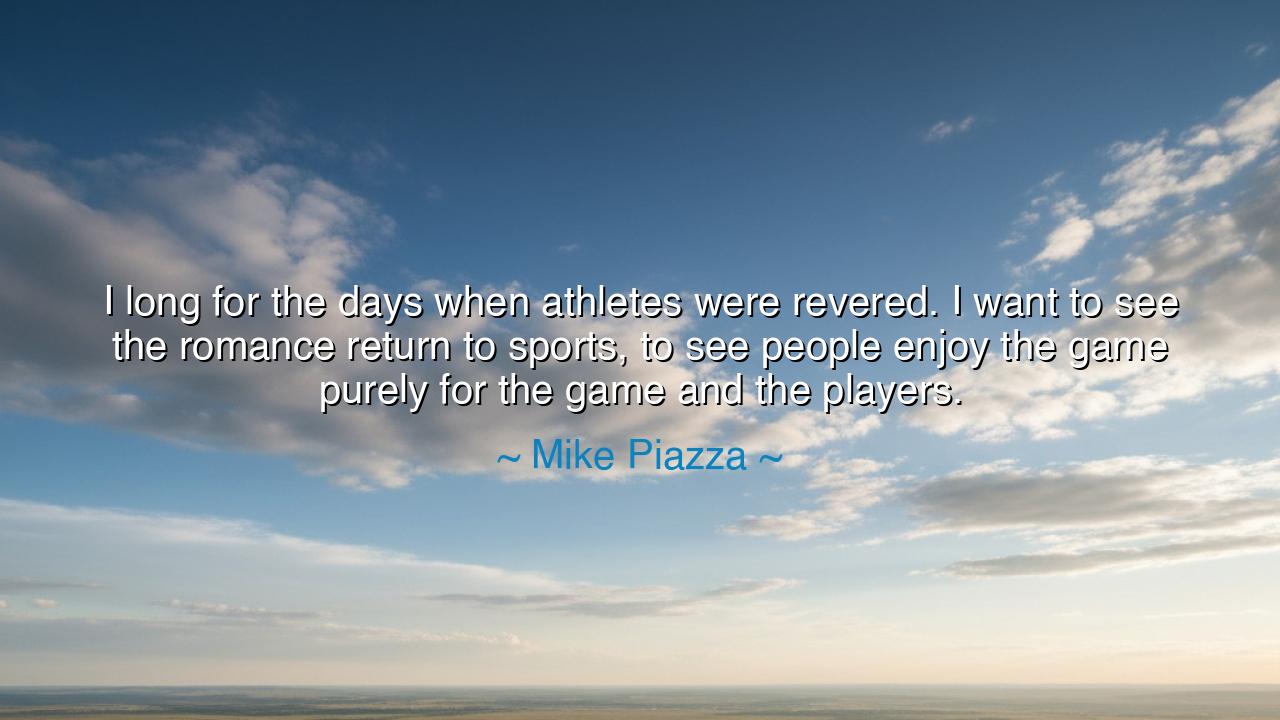
I long for the days when athletes were revered. I want to see
I long for the days when athletes were revered. I want to see the romance return to sports, to see people enjoy the game purely for the game and the players.






Hear the yearning words of Mike Piazza, who spoke not merely of a game, but of a spirit longed for: “I long for the days when athletes were revered. I want to see the romance return to sports, to see people enjoy the game purely for the game and the players.” This is no idle nostalgia, but a lament of a man who has witnessed the glory of sport dimmed by greed, scandal, and distraction. In his cry, there is a call to return to the purity of the field, when the crowd rose in awe not for contracts, endorsements, or headlines, but for the heroic efforts of the human body and soul striving toward victory.
The meaning of these words lies in the contrast between past and present, between the romance of sports and its modern corruption. Once, to watch a game was to partake in wonder—to see athletes as near-mythic figures who embodied courage, discipline, and beauty in motion. They were admired not for their wealth, but for their devotion, their skill, their heart. Piazza mourns that in our time, this reverence has faded. Fans often argue not about plays but about salaries, scandals, or politics, and the purity of the contest is overshadowed by the noise of commerce.
The origin of this truth lies in the very birth of sport. In the ancient Olympic Games of Greece, athletes competed not for gold coins, but for a simple crown of olive leaves. That wreath was worth nothing in markets, but everything in honor. Victors were celebrated as embodiments of human excellence, and their names were sung by poets like Pindar, who immortalized them in verse. It was romance in its highest sense: the union of beauty, struggle, and virtue. Piazza’s longing echoes this ancient tradition, a reminder that sport is at its best when it rises above mere transaction and becomes a celebration of human spirit.
Consider the story of Jesse Owens, who at the 1936 Berlin Olympics stood against the might of prejudice and the glare of a hostile regime. His victories were not merely records; they were symbols of dignity and courage that stirred the hearts of millions. The people did not revere him for wealth, but for the way he ran, for the way he carried himself, for the purity of his triumph. This is the very reverence Piazza yearns for—the kind of love for athletes that transcends the scoreboard and honors the nobility of their striving.
The lesson is sharp and urgent: when we lose the romance of sport, we lose more than entertainment—we lose one of humanity’s greatest teachers. For sport, at its core, is a mirror of life: it teaches perseverance in struggle, grace in defeat, humility in victory, and unity in shared witness. If we reduce it to business, if we honor only statistics or scandals, we deprive ourselves of its deeper meaning. To revere the athlete is to revere the lessons they bring—to see in their striving the echo of our own struggles.
Practical actions must follow. As spectators, we must choose to honor the purity of the game, to speak not only of controversies but of effort, sacrifice, and skill. As athletes, we must play not merely for wealth or fame, but for the love of the game itself, carrying forward the romance Piazza longs for. And as parents and mentors, we must teach the young to see sports not as a pathway to riches, but as a school of character. In doing so, we plant the seeds of reverence once more.
And so, child of tomorrow, remember Piazza’s lament. The romance of sports is not dead, but it waits to be reclaimed. It lives in every child who picks up a ball with joy, in every fan who cheers with sincerity, in every player who strives for the sheer love of striving. Cherish this spirit, and carry it forward. For when sport is loved for itself, it lifts us all—reminding us that beyond money, beyond politics, beyond scandal, there is something eternal: the human heart in pursuit of greatness.






AAdministratorAdministrator
Welcome, honored guests. Please leave a comment, we will respond soon